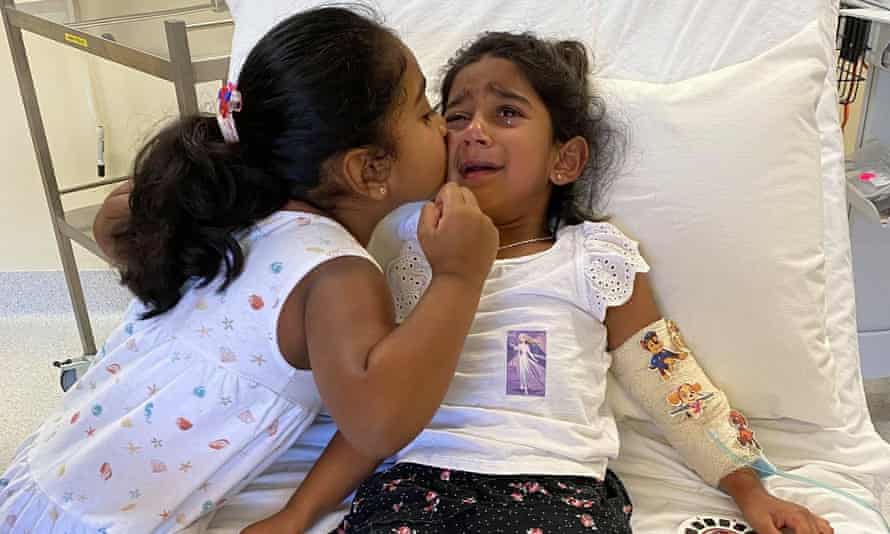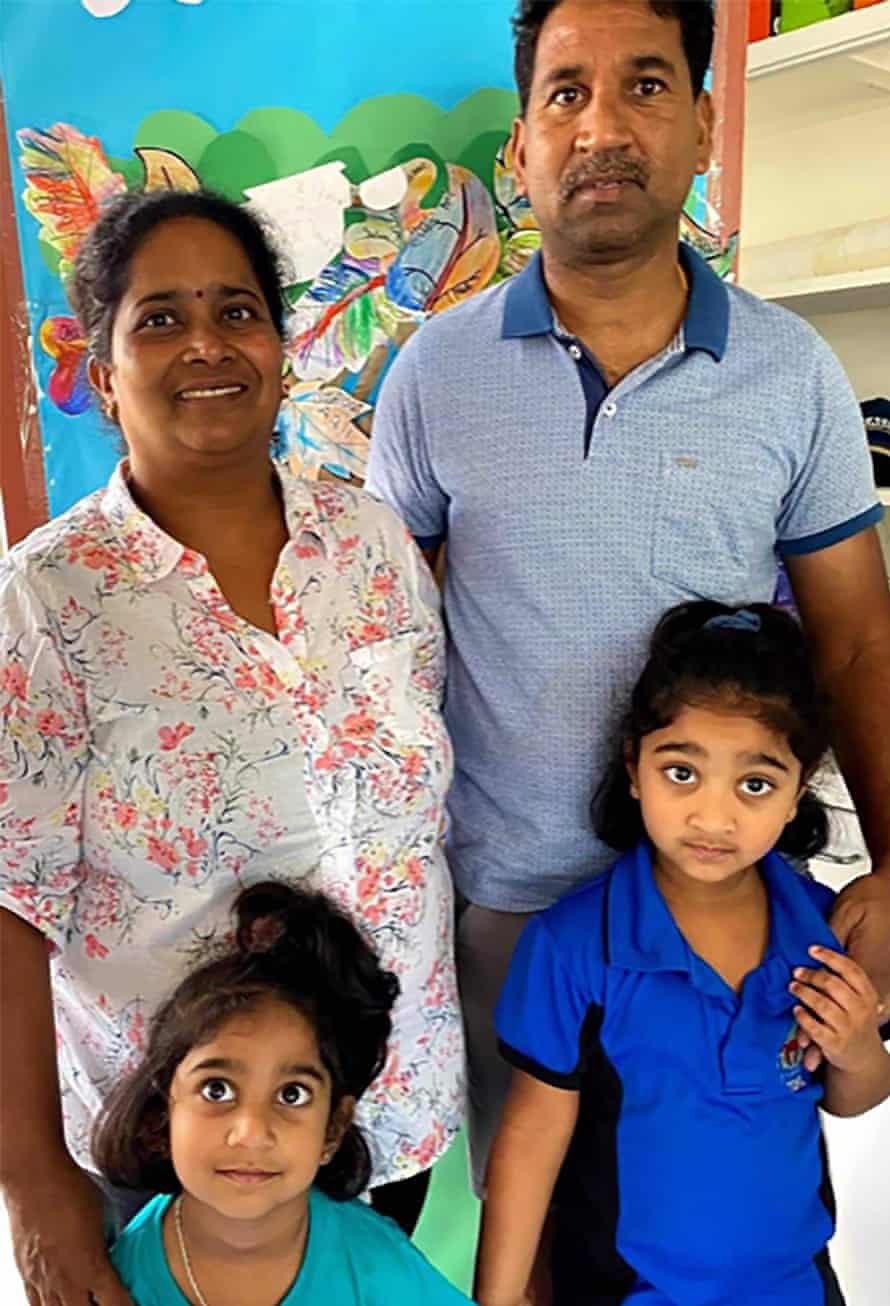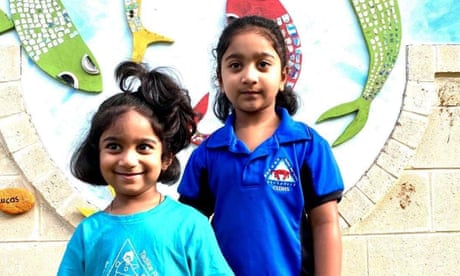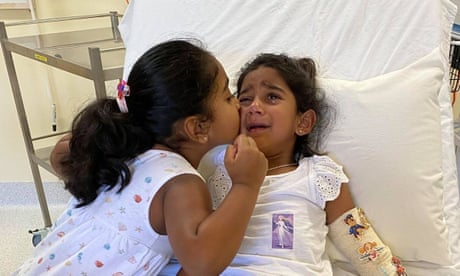Extract from The Guardian
Australian immigration and asylum
Tharnicaa is being treated in Perth after being medically evacuated from Christmas Island, two weeks after her ‘desperate’ mother Priya first sought help

Last modified on Tue 8 Jun 2021 18.42 AEST
Priya Nadesalingam has become a fierce advocate for her young daughters – Tharnicaa, three, and Kopika, five, – since her family was taken from their central Queensland home in 2018 and put in detention after her and her husband’s visas had expired.
Only allowed half an hour outside a day in the early months of detention, Tharnicaa and Kopika became vitamin D deficient and prone to repeated infections. Tharnicaa was two when her teeth were so rotten she needed surgery to have two of them removed.
On Monday, Tharnicaa was flown from Christmas Island detention centre to Perth Children’s Hospital suffering dizziness, vomiting and fever, more than two weeks after Priya first alerted doctors on the island that her daughter was unwell. She has since been diagnosed by the hospital with pneumonia and a blood infection.
For several days, medical staff on the island had treated Tharnicaa only with Panadol and Nurofen despite Nadesalingam repeatedly saying something more serious was wrong and urging them to prescribe antibiotics. On 1 June, a doctor on the island told her Tharnicaa looked “active and fine,” though Nadesalingam insisted she was anything but. One week later she was in hospital.
“Priya is … fiercely protective of [her children] and she’s had to be after enduring more than three years in detention,” Cameron said. (She last spoke to the family on Monday night after Tharnicaa had been admitted to hospital in Perth.)
“It’s absolutely enraging to hear about this latest illness, and just to think about how desperate it must have felt this past week for Priya and Nades [her husband] while they were trying to get their little girl help that they knew was desperately needed, and it was point blank refused.”
From first fever to medical evacuation: the crucial days
Nadesalingam says she took Tharnicaa to International Health and Medical Services (IHMS) staff and her temperature was 37.6. She was given Panadol and Nurofen. By Tuesday her temperature had risen slightly and she was still unwell, so once again staff gave her Panadol and Nurofen. This continued until Saturday 29 May, by which time Kopika was also unwell with a fever. But while she improved, Tharnicaa did not.

The ‘Biloela family’ on Christmas Island earlier this year. Photograph: Supplied
At Nadesalingam’s insistence, Tharnicaa was seen again on 30 May by an IHMS doctor, who diagnosed a urinary tract infection – despite other symptoms including an ear ache and runny nose inconsistent with a UTI. Tharnicaa’s parents were told this would clear up by itself in about five days. Again, she was given Panadol and Nurofen.
By Tuesday 1 June, Nadesalingam says she went to the IHMS doctor again and, this time, a urine sample was taken, even though the doctor said she looked “active and fine”. She was told to give her daughter plenty of water. Panadol and Nurofen were given continuously.
Nadesalingam said she wanted Tharnicaa seen again in two days and given antibiotics if she was not better. Two days later the doctor once again insisted Tharnicaa “looks fine and active”. Nadesalingam urged the IHMS doctor to prescribe antibiotics immediately, but again the request was refused. Panadol and Nurofen were given again, and the doctor said it was also unnecessary to conduct a blood test.
By Friday 4 June Tharnicaa was vomiting. The family called IHMS head office in Sydney because there were no IHMS staff available after hours, and they waited for one hour to speak to someone who again prescribed Panadol.
By Saturday Tharnicaa was vomiting more heavily, straight after taking the Nurofen. She had developed diarrhoea. Nadesalingam told the doctor she was worried, and again the doctor said “she looks fine”.
Her husband asked the doctor how they could tell she was fine given she had just vomited. At that visit, the doctor gave the family a factsheet about flu symptoms that was written in Tamil. The factsheet said if her temperature went higher than 38 degrees they should see a doctor, contradicting the doctor’s comments at each visit that they shouldn’t worry about a temperature unless it reaches 40.
By 5am, Tharnicaa’s temperature had reached 40 degrees. Nadesalingam called IHMS at 6am but they said the doctor had already been to visit earlier that morning and did not need to come again. When Nadesalingam protested, the IHMS staff member who had taken her call told her “don’t worry, relax Priya, calm down”, but agreed to send a doctor.
“Please take her to the hospital, she doesn’t look well,” Nadesalingam pleaded. Tharnicaa was finally taken to hospital at 9am. By the next day, she had been medically evacuated to Perth Children’s Hospital, accompanied by Nadesalingam. She had a suspected blood infection. She has since also been diagnosed with pneumonia.
Island care ‘broadly comparable’ to Australia
According to the Royal Children’s Hospital in Melbourne, pneumonia often comes after another respiratory infection, and can lead to complications. A high fever and stomachache are among the symptoms, and a GP should be seen urgently if vomiting develops.
The Department of Home Affairs said in a statement it is committed to the welfare of detainees, and healthcare on Christmas Island is “broadly comparable” with the broader Australian public health system.
“All of the Australian Border Force’s actions and decisions regarding the minor’s medical treatment and care have been based on medical practitioner’s clinical knowledge which is ongoing,” the statement said.
“The minor has been receiving medical treatment and daily monitoring on Christmas Island consistent with medical advice. As soon as the ABF was advised by the treating medical practitioners that the minor required medical treatment in Western Australia, the minor was transferred to a hospital in Western Australia.
The health issues faced by both Tharnicaa and her sister Kopika are part of a brief put before the immigration minister, Alex Hawke, arguing for the family to be released into community detention and for Tharnicaa to be allowed to apply for a visa, the family’s lawyer, Carina Ford, said on Monday.
“We have just put forward medical reports we’ve obtained that confirm the difficulties that children are now having as a result of long-term detention, which includes sleep disturbance, sensitive to sound, difficulties sleeping, etc.”
The Royal Children’s Hospital in Perth has not issued a statement about Tharnicaa’s condition upon arrival, but said on Tuesday afternoon her condition was stable.
David Isaacs, a clinical professor of paediatric infectious diseases with the University of Sydney who works in refugee health, says when he was treating asylum seekers on Nauru he and other medical staff saw children suffering what is referred to as “pervasive refusal disorder” or “resignation syndrome”, where they were so traumatised and distressed that they stopped eating and drinking.
“It was terribly traumatic for these children when receiving medical care to be separated from one of the their parents, and what I can not understand is why Tharnicaa was transferred to hospital with only her mother and not the whole family,” Isaacs said.
Tharnicaa is particularly close to her father, family friends say. A photograph taken of Tharnicaa in the island’s hospital before being airlifted to Perth shows her in tears lying on a hospital bed, her older sister kissing her cheek and attempting to comfort her.
“On top of Tharnicaa’s illness she has been separated from half of her family in this very cruel way, and you have to be highly suspicious that has a political and not a medical motive behind it,” Isaacs says.
“Because medically it is clear that this will be so damaging to a family we have already damaged so severely as a country by the way we have treated them.
“It’s appalling, and it’s time we found some compassion.”


No comments:
Post a Comment